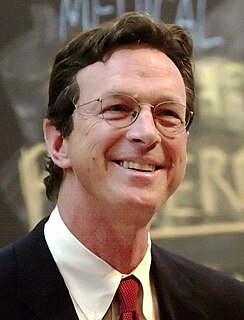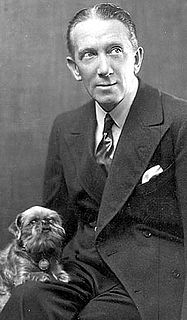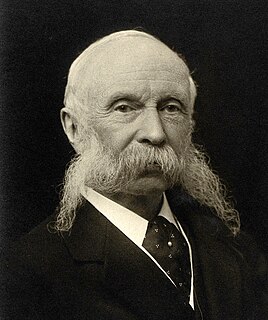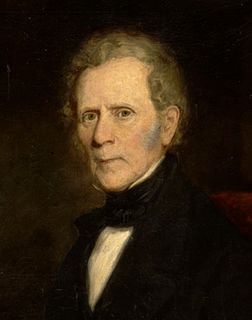
John Michael Crichton was an American author and filmmaker. His books have sold over 200 million copies worldwide, and over a dozen have been adapted into films. His literary works are usually within the science fiction, techno-thriller, and medical fiction genres, and heavily feature technology. His novels often explore technology and failures of human interaction with it, especially resulting in catastrophes with biotechnology. Many of his novels have medical or scientific underpinnings, reflecting his medical training and scientific background.

A Fish Called Wanda is a 1988 heist comedy film directed by Charles Crichton and written by Crichton and John Cleese. It stars Cleese, Jamie Lee Curtis, Kevin Kline, and Michael Palin. The film follows a gang of diamond thieves who double-cross one another to find stolen diamonds hidden by the gang leader. A barrister becomes a central figure as femme fatale Wanda uses him to locate the loot.

Marquess of the County of Bute, shortened in general usage to Marquess of Bute, is a title in the Peerage of Great Britain. It was created in 1796 for John Stuart, 4th Earl of Bute.

Earl of Caithness is a title that has been created several times in the Peerage of Scotland, and it has a very complex history. Its first grant, in the modern sense as to have been counted in strict lists of peerages, is now generally held to have taken place in favor of Maol Íosa V, Earl of Strathearn, in 1334, although in the true circumstances of 14th century, this presumably was just a recognition of his hereditary right to the ancient earldom/mormaership of Caithness. The next year, however, all of his titles were declared forfeit for treason.

Earl Erne, of Crom Castle in the County of Fermanagh, is a title in the Peerage of Ireland. It was created in 1789 for John Creighton, 2nd Baron Erne, who had earlier represented Lifford in the Irish House of Commons. He had already been made Viscount Erne, of Crom Castle in the County of Fermanagh, in 1781, also in the Peerage of Ireland, and sat from 1800 to 1828 as an Irish Representative Peer in the British House of Lords. The title of Baron Erne, of Crom Castle in the County of Fermanagh, was created in the Peerage of Ireland in 1768 for his father Abraham Creighton. The Earl was succeeded by his eldest son, the second Earl. On his death the titles passed to his nephew, the third Earl. He was an Irish Representative Peer from 1845 to 1885 and also served as Lord Lieutenant of County Fermanagh during the same period. In 1876 he was created Baron Fermanagh, of Lisnaskea in the County of Fermanagh, in the Peerage of the United Kingdom. This was to allow the Earls to sit in the House of Lords by right, rather than having to stand for election as Representative Peers. An earlier title of Baroness Fermanagh in the Peerage of Ireland was created for Mary Verney on 13 June 1792, but became extinct on her death on 15 November 1810.

The Admirable Crichton is a comic stage play written in 1902 by J. M. Barrie.

Charles Ainslie Crichton was an English film director and editor. Born in Wallasey, Cheshire, he became best known for directing many comedies produced at Ealing Studios and had a 40-year career editing and directing many films and television programmes. For his final film, the acclaimed comedy A Fish Called Wanda (1988), Crichton was nominated for both the Academy Award for Best Director and the Academy Award for Best Original Screenplay.

James Crichton, VC was an Irish-born soldier and a recipient of the Victoria Cross (VC), the highest award for gallantry in the face of the enemy that could be awarded at that time to British and Commonwealth forces.

Sir Gerald Hubert Edward Busson du Maurier was an English actor and manager. He was the son of the author George du Maurier and wife Emma Wightwick and brother of Sylvia Llewelyn Davies. During 1902, he married the actress Muriel Beaumont with whom he had three daughters: writers Angela du Maurier (1904–2002) and Daphne du Maurier (1907–1989), and painter Jeanne du Maurier (1911–1997). His popularity was due to his subtle and naturalistic acting: a "delicately realistic style of acting that sought to suggest rather than to state the deeper emotions". His Times obituary said of his career: "His parentage assured him of engagements in the best of company to begin with; but it was his own talent that took advantage of them."
George Leslie, 4th Earl of Rothes was a Scottish nobleman and diplomat.

Victor Alexander George Robert Bulwer-Lytton, 2nd Earl of Lytton,, styled Viscount Knebworth from 1880 to 1891, was a British politician and colonial administrator. He served as Governor of Bengal between 1922 and 1927 and was briefly Acting Viceroy of India in 1926. He headed the Lytton Commission for the League of Nations, in 1931–32, producing the Lytton Report which condemned Japanese aggression against China in Manchuria.

The First Great Train Robbery, released in the United States as The Great Train Robbery, is a 1978 British heist crime film directed by Michael Crichton, who also wrote the screenplay based on his 1975 novel The Great Train Robbery.

Clan Crichton is a Lowland Scottish clan.

Lieutenant-Colonel Lord Ninian Edward Crichton-Stuart was a Scottish senior officer in the British Army and Member of Parliament. He was killed in action in the First World War. The second son of the Honourable Gwendolen Mary Anne Fitzalan-Howard and John Crichton-Stuart, 3rd Marquess of Bute, he entered the army in 1903 and served in the Queen's Own Cameron Highlanders and the Scots Guards as a lieutenant. After marrying he began a career in politics, serving first as a councillor on Fife County Council, Scotland. His family having close connections to the city of Cardiff in Wales, he fought and lost the January 1910 election there as a Liberal Unionist candidate. The resulting hung parliament led to a second election in December 1910, in which Crichton-Stuart won the seat.

The Admirable Crichton is a 1957 British south seas adventure comedy romance film directed by Lewis Gilbert and starring Kenneth More, Diane Cilento, Cecil Parker and Sally Ann Howes. The film was based on J. M. Barrie's 1902 stage comedy of the same name. It was released in the United States as Paradise Lagoon.

Sir James Crichton-Browne MD FRS FRSE was a leading Scottish psychiatrist, neurologist and eugenicist. He is known for studies on the relationship of mental illness to brain injury and for the development of public health policies in relation to mental health. Crichton-Browne's father was the asylum reformer Dr William A.F. Browne, a prominent member of the Edinburgh Phrenological Society and, from 1838 until 1857, the superintendent of the Crichton Royal at Dumfries where Crichton-Browne spent much of his childhood.

John Henry Crichton, 4th Earl Erne,, styled Viscount Crichton from 1842 to 1885, was an Anglo-Irish peer and Conservative politician.
Andrew Crichton (1790–1855) was a Scottish biographer and historian.

Sir Alexander Crichton was a Scottish physician and author.

Major General George William Symes, was a senior British Army officer who served in the First World War, in which he was twice awarded the Military Cross. During the Second World War he commanded the 70th Infantry Division in India, and was deputy commander of the Special Force, commonly known as the Chindits, in Burma. He was deputy commander of the lines of communication of the 21st Army Group from May to November 1944, and then commanded the lines of communication in South East Asia Command (SEAC). In June 1945, he became general officer commanding (GOC) in Southern Burma.
















